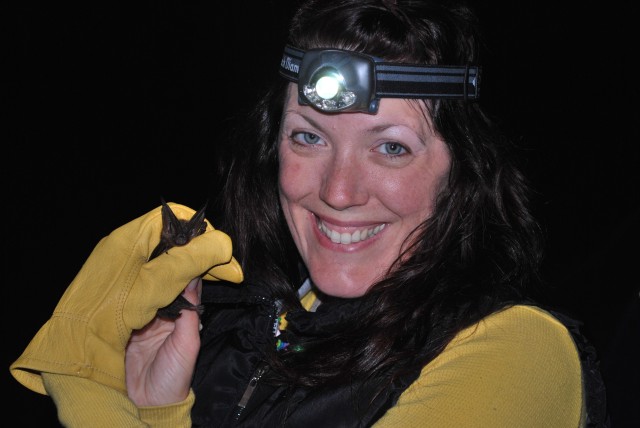SACRAMENTO, Calif. -- Most people find their hobbies enjoyable and relaxing. But Sacramento District's Chandra Jenkins' hobby is driving her batty - in a good way.
Jenkins, you see, spends countless hours 'hanging' out with and studying bats. In two or so short years, she has gone from being just intrigued and curious about the mysterious, oft-feared nighttime creatures to actively conducting research and considering it for a master's degree thesis.
"Bats are very interesting animals," she said, noting that more than 1,100 species have been identified. "All bats have such different life habits. Everything from where they roost and their different feeding habits, to migration versus hibernation, their reproduction, and the individuality between each species, just draws me in."
A student at California State University-Sacramento, Jenkins works in the district's regulatory division through the Student Career Experience Program, or SCEP, which provides degree seeking students with Federal work experience related to their academic program and career goals.
Though unrelated to her job with the Corps for now, her passion for bats is something she hopes to soon be able to bring to her work.
Most of her research for this unique hobby concentrates on what she terms the basic ecology of bats: roosting, foraging habits and reproduction.
"This gives us a better understanding of the roles they play in our lives," said Jenkins, who personally funds some of her research and receives grants from several agencies. "We take data such as weight, sex, forearm length, whether they are adult or juvenile, their reproductive status, the general health of the animal, and, of course identify the species. We look at the type of habitat we have caught them in, and in some cases, we collect guano to have analyzed. The information collected is compiled and turned into the state agencies every year. The data can be used for various reasons."
When some people think bats, they tend to conjure up frightening or macabre thoughts - Dracula and the various forms of bloodsucking, eerie creatures. Jenkins offers a more factual explanation.
"What most people do not realize is that bats are a great ally to us," Jenkins said. "A single little brown bat can eat up to 700 crop-destroying insects in a night. That's just one little bat! Mexican free-tailed bats live in very large roosts. The caves in central Texas are home to 100 million bats. These bats are estimated to eat about 1,000 tons of insects nightly.
"Think about how many insects these bats are exterminating for our agricultural needs on an economic level," Jenkins continued. "It's safe, pesticide free and helps keep our insect populations in check. They eat mosquitoes, too. If we were to take bats out of the animal population, we would see a devastating outcome, globally. Just like all other species, preservation is crucial."
Her bat hobby has taken her outside of California, where she has conducted extensive research.
"I have been blessed with many opportunities while working with bats," she said. "I have worked in many different places throughout California and into Baja. I have also worked a bit in Belize. I have been so fortunate to work with some of the greats of the bat biology world. My goal is to go to either Panama or Costa Rica, or both, next year."
While there is no direct connection between her bat research and Corps job, yet, Jenkins believes she will link the two eventually.
"I'm still trying to find a way to tie in my bat work with the work I do for the Corps," she said. "I would like to do a study on wetland restoration and how bats use these areas. Maybe a master's thesis. I have also helped numerous people within our District office with bat related issues, like bats in attics or sick bats found on properties."
Prior to studying bats, Jenkins worked as a small business owner and manager for over a decade before returning to the classroom. That's about the time she turned to the Corps of Engineers and the SCEP, which allows a student to work full-time or part-time while going to school. SCEP students also receive the same health, retirement and leave benefits as career government employees.
"You also gain experience in the career field of your choice," Jenkins said. By the time you graduate, you have a good amount of experience with the Corps and become eligible for other positions within the agency. I love it!"
So, a hobby has turned into a career for Jenkins, who said she didn't necessarily start with those intentions.
"I worked with bats extensively for about two years and carefully observed others working with them and studied them for about a year before that," she said. "I wanted to make sure it was really a passion before I delved in."
Based on her recent track record, it appears safe to say she is serious about her hobby-turned-lifelong pursuit.
"I have learned an incredible amount, but at the same time haven't even scratched the surface of what is still out there to be learned or discovered," Jenkins said. "I will be assisting on a few different projects this year involving bats. One entails acoustic monitoring (using the analysis of the echolocation frequencies to identify species). The other is assisting other researchers with their studies. I am in the process of obtaining my own permit, so right now, most of the work I do is with other researchers."




Social Sharing